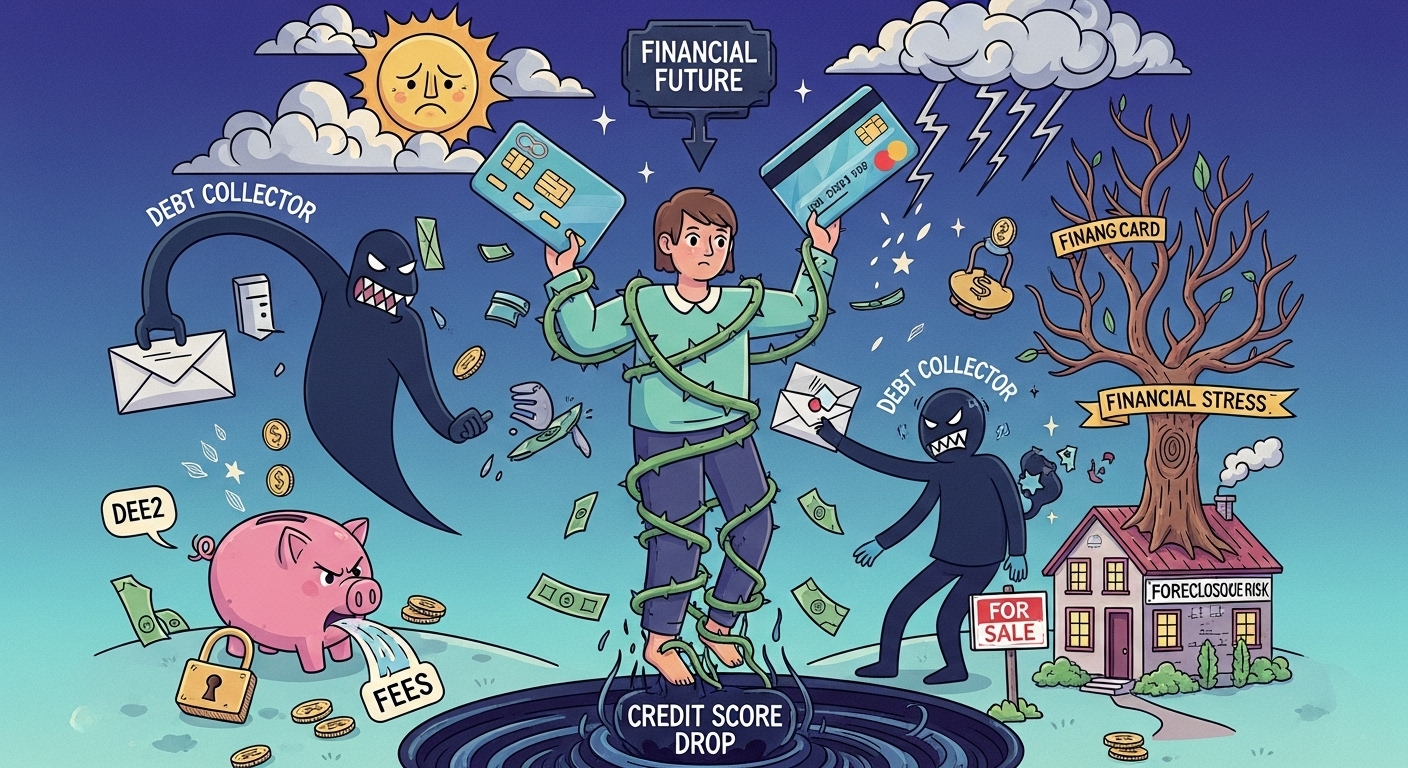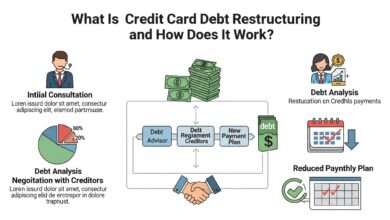What Happens If You Don’t Pay Your Credit Card Debt?

Credit cards can be incredibly convenient for managing expenses, but when you miss payments or fail to pay off your balance, things can spiral out of control faster than you might expect.
Not paying your credit card bill doesn’t just lead to late fees — it can damage your credit score, increase your debt through high interest, and even lead to legal action in severe cases.
In this comprehensive guide, we’ll break down what really happens if you don’t pay your credit card debt, how each stage affects your finances, and what you can do to prevent or recover from it.
1. The First Missed Payment: Immediate Consequences
Once you miss a credit card payment, the impact begins almost immediately.
Here’s what typically happens within the first 30 days:
- Late payment fee: Most banks charge a fee (usually $25–$40) if your payment isn’t made by the due date.
- Interest accumulation: Your balance starts accumulating high interest (often 15%–25% APR or higher).
- Loss of grace period: You lose the interest-free period for new purchases until your account is brought current.
✅ What to do:
If you miss a payment, pay as soon as possible — even a few days late is better than not at all. Many issuers will forgive the fee for first-time offenders if you contact customer service promptly.
2. After 30 Days: Credit Score Damage Begins
Once your payment is 30 days late, your credit card issuer can report the delinquency to credit bureaus.
Impact on your credit score:
- A 30-day late payment can lower your score by 60–100 points.
- The negative mark stays on your credit report for up to seven years, though its effect lessens over time.
✅ What to do:
Pay the overdue balance immediately and request your issuer not to report it if possible. Some lenders might hold off reporting if you act quickly.
3. After 60–90 Days: Fees and Collection Warnings
At this point, your debt continues to grow.
Here’s what happens next:
- Higher late fees and interest: Your unpaid balance now includes late fees, interest, and possibly penalty APR (a higher interest rate applied due to missed payments).
- Calls and letters from the bank: You’ll start receiving reminders and warnings.
- Credit score damage worsens: A 60-day late payment is even more damaging to your credit.
✅ What to do:
Contact your bank’s collections department and explain your situation. Some lenders offer temporary hardship programs or payment plans to help you get back on track.
4. After 120–180 Days: Account Charge-Off
If you still haven’t paid after about six months, your issuer will likely charge off your account — meaning they’ve written it off as a loss.
However, this doesn’t mean your debt disappears. In fact, this is when things get serious:
- The bank may sell your debt to a collection agency.
- Your account will show as a charge-off on your credit report — one of the most damaging entries possible.
- Your credit score can drop by 100–150 points or more.
✅ What to do:
Even after a charge-off, you can negotiate with the bank or collection agency to settle your debt for less than the full amount. Always ask for a “paid as agreed” or “settled” note to be added to your credit report.
5. Debt Collection Begins
Once a debt is sold to a collection agency, you’ll start receiving calls, emails, and letters demanding payment.
Collectors may:
- Offer settlement deals (e.g., pay 60–80% of the balance).
- Report your account as in collections, further hurting your credit.
- Continue to contact you until the debt is resolved.
✅ What to do:
- Always communicate in writing — this creates a record of all agreements.
- Never ignore collectors, but ensure they’re legitimate before making payments.
- You have legal rights under laws like the Fair Debt Collection Practices Act (FDCPA) (in the U.S.) that protect you from harassment.
6. Possible Legal Action
If the debt remains unpaid, the lender or collection agency may file a lawsuit against you to recover the amount owed.
Consequences may include:
- Court judgment: The court orders you to repay the debt.
- Wage garnishment: A portion of your salary may be automatically deducted.
- Asset seizure: In some cases, property or bank accounts may be affected (depending on your country’s laws).
✅ What to do:
If you receive a court notice, don’t ignore it. Seek legal advice and attend the hearing — failing to show up could result in an automatic judgment against you.
7. Long-Term Impact on Your Financial Life
Not paying your credit card debt can affect more than just your score. It can influence:
- Loan approvals: Banks will hesitate to approve new loans or mortgages.
- Interest rates: You may only qualify for higher interest rates in the future.
- Job opportunities: Some employers check credit reports during hiring.
- Rental applications: Landlords often review credit reports before approving tenants.
Even after paying off old debts, rebuilding your credit can take years.
8. How to Recover from Missed Payments or Unpaid Debt
If you’ve fallen behind, recovery is possible — it just takes time and discipline.
✅ Steps to rebuild your financial health:
- Pay off the balance or settle the debt with your creditor or collector.
- Create a repayment plan and stick to it.
- Monitor your credit report for accuracy — make sure paid debts are correctly updated.
- Use a secured credit card or small loan to rebuild your score.
- Stay consistent: On-time payments and low credit utilization will gradually restore your credit standing.
9. Prevention: How to Avoid Getting Into Debt Trouble
To prevent falling into this situation:
- Pay on time: Automate payments to avoid missed deadlines.
- Spend within your means: Treat your credit card like cash, not extra income.
- Build an emergency fund: Even $500–$1,000 can prevent dependence on credit in tough times.
- Regularly review your statements: Stay aware of how much you owe.
Financial discipline and awareness are your best defenses against overwhelming credit card debt.
Final Thoughts
Not paying your credit card debt can set off a chain reaction — from late fees and credit damage to collections and possible legal action. The longer you delay payment, the harder and more expensive it becomes to fix.
However, you’re never without options. Communicate with your bank early, negotiate if you’re struggling, and take proactive steps to regain control.
Remember: Financial problems happen — ignoring them makes them worse. The sooner you act, the easier it is to recover and rebuild your financial health.
